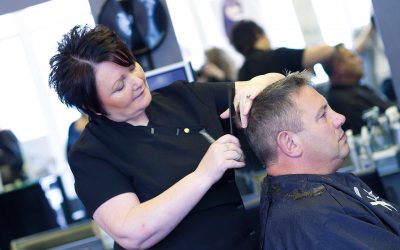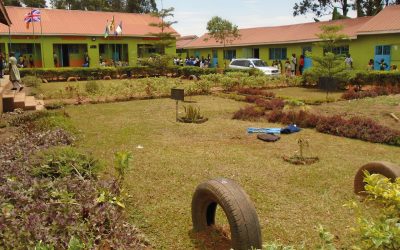The Champions Awards recognise individual heroes for projects at home or overseas.
Here, this year’s Champions write in their own words, about what their project means to them, what it entailed and how it has made a difference.
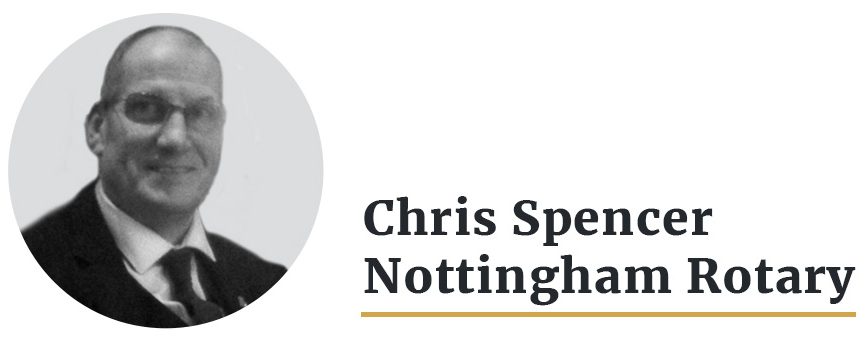

Author: Chris Spencer
Nottingham Rotarian Chris Spencer joined Rotary in 2010 following an introduction via a business networking group.
In May 2019, he was presented with a Rotary Champion of Change Award for his outstanding work in the local Broxtowe/ Strelley/Aspley community of North West Nottingham.
In February 2014, Chris encouraged a group of local lads to start a five-a-side football group, – he ferried them to the five-a-side centre, he started to coach them and the blue touch paper was ignited.
At this point in time there was no connection to Rotary, – this changed when Nottingham Rotary offered support with provision of kit and funding, and so Notts Rotary FC was born!
Nine months later, those not playing football were identified as needing some form of organised activity and the youth club was started.
These two groups are connected. Young people from the area meet every week and numbers have grown, albeit slowly.
At this point in time there was no connection to Rotary, – this changed when Nottingham Rotary offered support with provision of kit and funding, and so Notts Rotary FC was born!”
They have continued to attract and retain membership spending their time playing chess, basketball, badminton, table tennis, pool and ‘chilling out’ to funny music’.
Despite the environment and local pressures these young people are making friends and have turned their backs on crime, anti-social behaviour, drugs and alcohol abuse. They are studying, working and will become tomorrow’s citizens. The local vicar refers to them as “beacons of light in their community over the years”.
Six years ago Chris and his wife Linda were deeply affected by personal tragedy after the loss of their 10-year-old daughter Katie.
This motivated Chris to create a scheme to collect, repair, and distribute unwanted toys for the benefit of other children in the local area.
Nine years on, more than 9,400 toys have been processed.
In his working life, 55-year-old Chris is a senior electrical engineer, almost essential requirements for the guy that maintains Nottingham Rotary’s Christmas sleigh.
Are the lights okay, tyre pressures, and batteries a bit low? He even clears up after the reindeer!
Most years see Chris involved in other community activities such as the sponsored walk from Mansfield to Nottingham, overnight sleep-outs to highlight the conditions which homeless people face.
The most recent event raised over £8,000. Pre-Christmas events have seen Santa Chris in his outfit at the Bilborough Festival or sitting on the sleigh.
It’s been real community involvement. In 2016, Chris took on the role of President of Nottingham Rotary. It was a busy year, and at the end of it he was awarded a Paul Harris Fellowship.
This was in recognition of his efforts as a Rotarian and, in particular, his tireless work in and for the community.
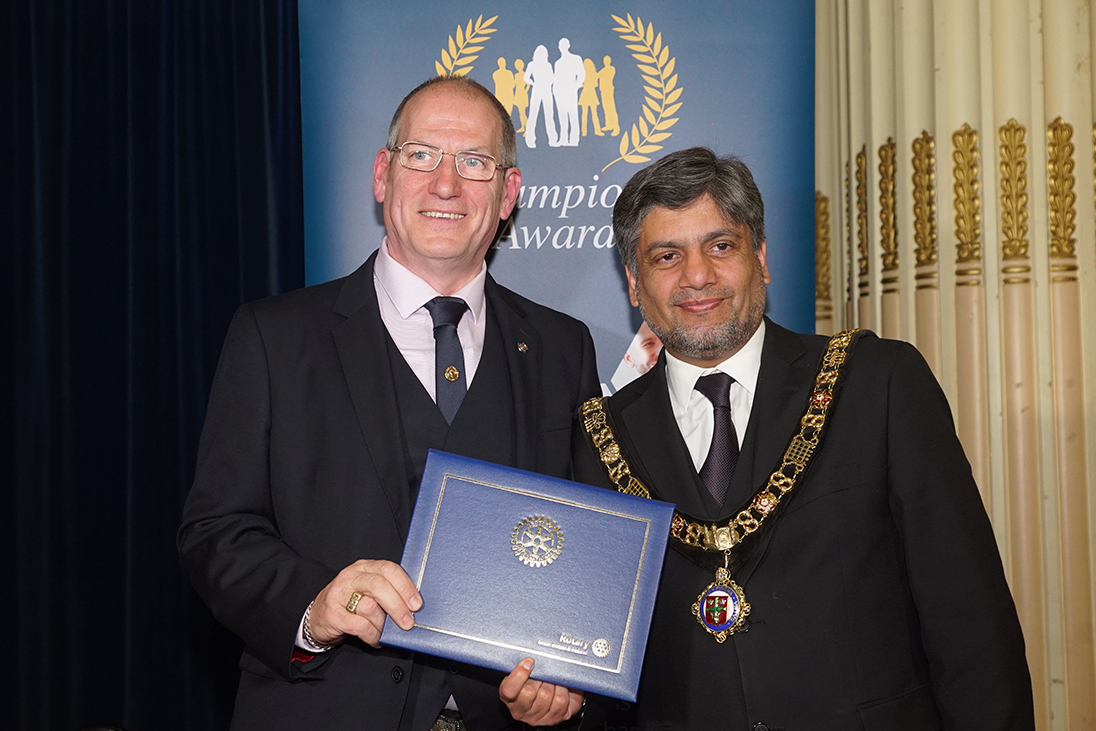

Chris has shown huge dedication to his local community of Strelley and Broxtowe. With very few activities in this underprivileged area for young people, he set up a youth club and coaches a fi ve-a-side football team. He has also been deeply affected by personal tragedy after the loss of his daughter at the age of 10. But in her memory, Chris created a scheme to collect, repair and distribute unwanted toys to children who often don’t receive presents.
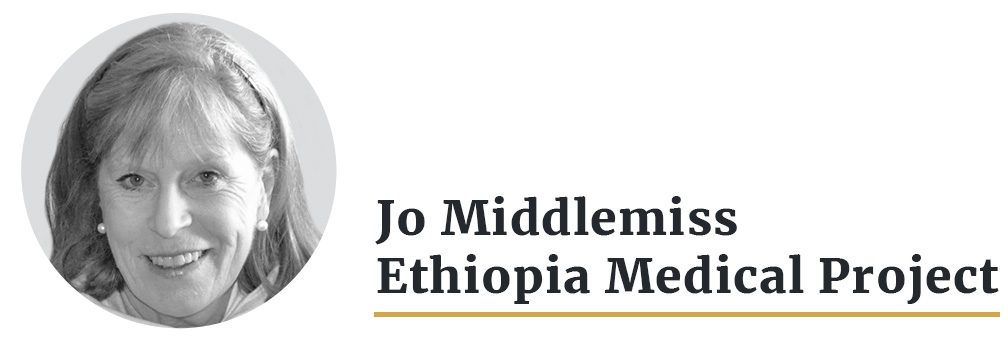

Author: Jo Middlemiss
The Ethiopia Medical Project started from very small and humble beginnings.
By chance, my cousin Maureen and I came across the Buccama Clinic in southern Ethiopia.
This little clinic was struggling to look after hundreds of women suffering from uterine prolapse, in its most severe form.
Uterine prolapse occurs when pelvic floor muscles and ligaments stretch and weaken, no longer able provide enough support for the uterus. As a result, the uterus slips down into or protrudes out of the vagina.
Uterine prolapse can occur in women of any age. But it often affects postmenopausal women who have had one or more vaginal deliveries.
The clinic did not have the resources to feed and care for these women, let alone give them the medical care which they needed. They were shunned by their families, ashamed of their condition and helpless to do anything about it.
So we felt we must step in. Initially, we thought we could help in small ways – food, mattresses and maybe some contributions towards medicine and surgical care. That was 10 years ago.
All they need is water, soap, disinfectant, vaseline, socks and shoes. It’s all so seemingly simple – simple, but not easy.”
We embarked on learning about uterine prolapse, and seeing how best we could intervene.
Hygiene education, introduction of underwear, and a very simple procedure can send most women back to normal life. So that became our core work.
We fund-raise all year long for the clinic, its staff and many of the things it needs. We have introduced Pessary Rings, which negates the need for surgery, but relieves them quickly.
We have now put over 8,000 women through our programme.
The highlight of this work has been the shift in attitudes towards the silent suffering of the women. Shame and stigma has been reduced. We have achieved this through education, ours and theirs.
The mothers have been our primary concern. However, we are now also heavily involved in the relief of podoconiosis, a form of elephantiasis of the lower limbs, which is not contagious, but comes from the red volcanic soil.
Most people are subsistence farmers and very poor indeed. Only recently has a cure protocol come to light. All they need is water, soap, disinfectant, vaseline, socks and shoes. It’s all so seemingly simple – simple, but not easy.
We are trying to make it easy, by changing attitudes, education and providing these basics. The staff were afraid of the disease, and unable to help. That has all changed. To us, this is the highlight of what we have been doing in our monthlong annual visits.
Our motivation is the satisfaction from implementing these simple things, as well as making a real difference to individual lives, and the whole community.
Our fund-raising efforts in Scotland take many forms. We speak to many groups and organisations who have taken an interest in us.
I am particularly grateful to Rotary clubs throughout Scotland for all the support that we have received from them.
I am humbled and honoured to receive this award, and I’d like to dedicate it to the noble people of southern Ethiopia who, in most cases, have nothing but what they stand up in.
Yet they are loving, long-suffering, and proud. They are what makes us get up in the morning.
The future is to do more of the same and leave a legacy for our younger supporters to take up this project into the 2020s and beyond.


The Ethiopia Medical Project was founded ten years ago by Josephine Middlemiss and Maureen Burnett. Their aim was to help women in a remote part of Ethiopia who were suffering from Uterine Prolapse. Josephine has captured the hearts of women in Scotland to support the charity.









